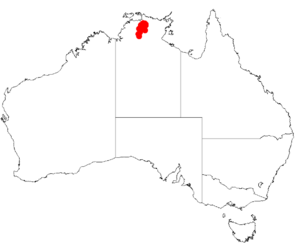Acacia echinuliflora facts for kids
Quick facts for kids Acacia echinuliflora |
|
|---|---|
| Scientific classification | |
| Genus: |
Acacia
|
| Species: |
echinuliflora
|
 |
|
| Occurrence data from AVH | |
Acacia echinuliflora is a special type of tree found only in northern Australia. It belongs to the Acacia family, which is a large group of trees and shrubs.
Contents
About the Acacia echinuliflora Tree
This tree usually grows to be about 4 to 8 meters (about 13 to 26 feet) tall. That's like the height of a small house! It has bark that is dark brown to black, and it feels rough and shaggy. Its smaller branches are reddish-brown and have a sticky, resin-like feel.
Leaves and Flowers
Instead of regular leaves, Acacia echinuliflora has something called phyllodes. These are like flattened leaf stems that do the job of leaves. They are always green and feel a bit leathery. They are also smooth, meaning they don't have any hairs.
The phyllodes are long and narrow, shaped like an oval or a spear tip. They can be straight or slightly curved. They are flat and shiny, growing to about 9 to 18.5 centimeters (3.5 to 7 inches) long and 6 to 14 millimeters (about 0.2 to 0.5 inches) wide. Each phyllode has a clear main vein down the middle and two smaller veins.
This tree blooms, or flowers, between June and August. It produces beautiful bright yellow to golden flowers. These flowers grow in long, cylinder-shaped groups called flower-spikes. Each spike is about 5 to 7 centimeters (2 to 2.7 inches) long and can grow alone or in pairs where the phyllodes meet the branch.
Seed Pods and Seeds
After the flowers bloom, the tree forms seed pods. These pods are straw-colored and also feel a bit sticky. They are long and can be straight or wavy. Inside, they have bumps where the seeds are. Each pod is about 7 to 9 centimeters (2.7 to 3.5 inches) long. The seeds inside are brown or black and are shaped like small oval or egg-shaped beans. They are arranged across the pod.
Where Acacia echinuliflora Lives
This tree is endemic to the Northern Territory in Australia. This means it is found naturally only in this specific area and nowhere else in the world. You can often find it growing along the rocky cliffs in the western part of Arnhem Land in the north. It also grows further south, all the way to Nitmiluk National Park.
It likes to grow in sandy soils, especially near creeks and streams. These waterways help drain the water from the cliffs, providing the perfect home for Acacia echinuliflora.

